- Home
- Carolyn Keene
Captive Witness Page 11
Captive Witness Read online
Page 11
Occasionally, they stumbled into holes but soon learned to glide with their feet just grazing the bottom.
The shoreline became increasingly swamplike as they moved into Hungarian territory, and there were few lights to show them where land was. Since it was now close to midnight, most house lights had been extinguished. For a while, the two young people lost their bearings and were forced to stop.
“What I wouldn’t give for one burst of moonlight,” Nancy said.
She had no sooner spoken when a tremendous flash of light zigzagged across the sky followed by a clap of thunder. In the glow that spread over the whole lake, they could see clearly that they weren’t far from the twisted tree that Popov had said was near his hiding place.
“Are you all right, Nancy?” Eric asked.
“Yes, but scared. I thought they were shooting artillery at us.”
“Give them the signal,” Eric went on.
Taking out her duck call, Nancy blew three short, sharp quacks. There was no answer. She tried again, but still no reply.
“Should we go up onshore?” Eric asked.
Nancy was about to say yes when they heard the answering cry of Popov’s duck call. Moments later, faint shadows bulked out of the night and Nancy and Eric waded ashore to meet them.
Emile Popov was carrying one child, a six-year-old. “He can sleep through anything,” he said, handing the boy to Eric. “Be careful when you put him in the tube. The water will wake him and we don’t want him to cry out. ”
Nancy and Mrs. Popov took the other two six-year-olds. The older children gathered around Emile Popov, holding onto a rope he carried to keep them together.
Eric began speaking softly to the children, paying special attention to the thirteen-year-old boy who was his cousin. In spite of their joyous reunion, the two kept their voices low.
Nancy now took charge of painting everyone’s faces black, but as she finished, Eric whispered nervously.
“Listen! Everyone be still.”
The group froze at the sound of several automobiles approaching.
“Trouble,” Mr. Popov said. “They’re coming. No one else would be coming at this hour. Quickly! Quickly!”
Shoving off and keeping low behind the high reeds that covered the inshore waters, the little convoy began moving north again toward the Austrian border.
Car doors opened and closed now and the loud voices of Hungarian police guards drifted across the lake. They trained their flashlights on the hut where the refugees had hidden, then swung the lights toward the shore.
Did they suspect that the escape was being made by water? Would they send out boats? Nancy knew that the Hungarians had small patrol craft as did the Austrians, but since this was a relatively peaceful border, she hadn’t worried about them.
The urgency of the situation prompted all of the children, except the smallest, to slip out of the tubes and help push. Each of the older ones stayed close to a younger one, using a buddy system they had devised over months of hiding throughout Eastern Europe.
The searchers, running now along the shore, shone their lights out across the water.
“Stop,” Nancy whispered.
Everyone halted instantly. The flashlight beams played over and around them, but the darkness of their attire and the cover of tall reeds kept them from being seen.
If only it would rain to block their vision, Nancy thought.
But the rain didn’t come and the flashlights continued to sweep across the lake. Then, after ten minutes, drops began to dot the water. Within another minute, a full-scale storm was raging, and the curtains of water made the flashlights useless.
Jubilantly, the convoy started moving again. Pushing and swimming as hard as they could, they approached the Austrian border. The flashlights, now dim blobs, receded toward the direction from which they had come.
“Only two hundred yards to go,” Eric whispered over his shoulder.
“Look!” Nancy exclaimed suddenly.
Lying directly in front of them was a powerful light that attempted to cut through the heavy rain. It was mounted on a small patrol boat.
For the first time since their mission began, Nancy wanted to cry. There was no way to tell if it was a Hungarian or Austrian craft in the dark. They were so close to freedom, and the children were so cold from the lake water that they struggled to keep their teeth from chattering.
Oh, please help us, Nancy prayed as Eric moved to her side.
“I’ve got an idea,” he whispered. “I’m going to swim out toward the center of the lake, a few hundred yards or so, then cross to the Austrian side. Then I’ll start shouting and screaming like a maniac. The patrol is sure to be distracted enough so you can scoot through with the kids.”
“Oh, Eric, am I glad you dreamed that one up. I just ran out of ideas. Be careful, though.”
“I will.”
It took the young man fifteen minutes to position himself. By then, the rain had slackened and the light from the boat was scanning the area with such intensity that the little group was forced to wade far back into the reeds and crouch low.
Suddenly, Nancy heard Eric. He was whooping and yelling like an Indian tribal attack on a frontier fort. The men in the patrol boat reacted instantly and cruised toward the uproar.
Pushing out of the reeds once again, Nancy and the Popovs covered the final distance of the border in five minutes. They didn’t stop until they reached the theater. Coming out of the water into the chill night air, some of the children at last began to whimper. The Popovs went from one to the other, murmuring words of comfort for they were now safe on Austrian soil.
While the couple led the children to the limousine where warm blankets awaited them, Nancy observed an Austrian patrol boat pull ashore with Eric and two Austrian policeman. They wanted to see for themselves if the young man’s tale about the refugees was true. Discovering that it was, they saluted and left.
Of course, jamming so many people into one automobile, even though it was large and ten of the occupants small, was no easy task. But nothing could dampen anyone’s spirits. Within half an hour, most of the children had fallen asleep. Nancy was surrounded by four of the smallest ones in the front seat.
“Are you happy, Eric?” she asked.
“It’s a dream come true,” he said, “and may I add that you were fantastic.”
“Oh, I don’t know about that,” she said with a lilt in her voice. “You’re the one who really wins the honors. If you hadn’t pulled that stunt, we never would have made it. ”
“Aw, shucks,” Eric said, imitating the twang of Old West movie heroes. “It weren’t nothin’.”
Nancy laughed, but a sobering thought stopped her. Everything except recovering Kurt Kessler’s film had been accomplished. He had risked his life to help save the children, but the young detective’s personal assignment to find Captive Witness had failed.
For the rest of the trip back to the hotel, she racked her brain. Was there no way to recover that film?
20
Herr Gutterman Unmasked
When they finally reached the hotel, the Popovs and the children were met by members of the refugee organization. It would arrange their transportation to relatives and friends in England and America.
Professor Bagley then related the events at the Czechoslovakian border. “They tried to fool us by showing up with ten other children who had been trained to lie about their identities. Fortunately, I had been given photographs of the real orphans. How the Hungarians carried on, screaming and threatening!”
“George took off her wig and waved it at them.” Bess giggled. “That really infuriated them.”
“Then Burt got out of the wheelchair and started dancing with her.” Dave laughed. “The commissar or whoever he was turned purple!”
“On the whole, it has been a huge success.” Dr. Bagley smiled. “Thanks largely to Nancy.”
“You are much too kind, sir,” she said. “Everyone did his or her part beautifully. Th
e only thing that has me down is the fact I can’t find Captive Witness.
Kurt Kessler, who was enjoying a cup of coffee and chatting with Ned, turned to reassure Nancy again. “Yes, I wish I had my film back, but I’ll make other films—better ones, too. Please don’t worry so.”
Nancy explained, though, that it was irritating to have seen half of it yet to be unable to locate the place where it had been shown.
“You actually saw it?” the director cried, causing Nancy to reveal the incident of her meeting with Gutterman.
“Unfortunately, Vienna has no grid system of streets like other cities,” Nancy said, “so the twists and turns we took really confused me.” She paused a second. “I did hear certain sounds, though.”
“What were they?” Kurt Kessler inquired with mounting eagerness.
“Well, trains. A train yard, to be exact, and a merry-go-round. ”
The film director furrowed his brow for a few moments, absentmindedly pulling at his shirt cuffs. Suddenly, he stopped and gripped the table with both hands. “Wait a minute!” he exclaimed. “I stayed in Vienna for a time before going to America, and I think I know where you were.”
Nancy and the director dashed down the three flights of stairs, found the rental car and, with Mr. Kessler at the wheel, they headed north.
“You were somewhere between the great railroad yards up ahead and the Prater amusement park on the right. The building with its twelve steps has to be around here.”
Completely elated, Nancy shone her flashlight on the buildings as her companion drove the car up and down the streets in the area. They found nothing, though.
“Let’s not give up yet,” Nancy said, causing him to speed the vehicle in another direction. Silently, they rode down a series of side streets lined with more old, run-down buildings. Then Kurt Kessler turned a sharp corner, and Nancy gasped in excitement. “There—down that side street. The second building! It has twelve steps!”
Kessler counted them and accelerated the gas pedal. When he finally halted the car, they stepped out fast and hurried up to the front door. It was locked, but it took the director only a few seconds to open the lock with a tiny metal pick.
“Someday I’ll have to tell you how I escaped out of Hungary,” he said to Nancy who was grinning almost as broadly as he was.
Once inside, the young detective closed her eyes, recalling how she had been turned when taken there by Gutterman. She indicated the door to the director. He motioned her to stand back as he listened carefully.
“Someone is in there,” he said softly. Then, without another word, he put his shoulder to the door and burst through. Nancy was right on his heels.
“Good evening,” came a voice from a chair that swiveled to face the two visitors.
It was Adolph Gutterman! In one hand, he was holding the film Captive Witness and in the other, a flaming cigarette lighter. His eyes seemed glazed as if he were entranced by the fire.
Kessler moved forward, slowly, staring into them. “Hagedorn?” he said softly. “Heinrich Hagedorn?”
Gutterman did not reply. The lighter was flaming wildly now, threatening to singe the man’s finger. Gently, Kessler took the lighter and then the film. He placed it in its tin container.
“You know him?” Nancy asked in bewilderment, adding, “I don’t understand—he just let you take the film right out of his hand without a protest.”
Kessler lowered his eyes toward Hagedorn’s trembling fingers as they covered his face, muffling a deep cry.
“We were in the film business together when we were young,” Kessler murmured. “He was a good director. A great actor. A master of disguises, voice changes. One of the best in the world.”
“How did he come to be a spy then?” Nancy asked.
As she spoke, the man slumped back in his chair, frozen in shock.
“It’s a long story,” the director continued. “I don’t even know it all. He lost both parents in Nazi concentration camps. Those who took control, fed him, educated him, trained him to act and direct. But he was too wild, too creative. He wanted to do things his own way.
“He made a short film that was the most devastating attack on political oppression I have ever seen.”
“More devastating than Captive Witness? Nancy asked.
“Much more. He went to prison for years because of it. Then suddenly, he was released on condition that he make propaganda films for his country. What he really was being trained for was a future in espionage. He became a spy in order to keep his wife and children fed. ”
Now Kessler’s voice began to waver. “He had compromised everything for the people he cared about most—”
“I still don’t understand, though, why he just let you take that film right out of his hand,” Nancy interrupted quietly.
Kessler took a deep breath before going on. “Because of our friendship, I suppose,” he said.
“He and I were in prison at the same time. When he finally managed to get out, he helped me escape. I remember he said it was more important for my film work to be seen than his.
“Unfortunately, neither Heinrich nor I realized that our captors would pin my escape on him. The next thing I learned was that his wife and children had been killed in an automobile accident.”
“How terrible!” Nancy gasped.
She gazed at the man in the chair whose eyes were now pinched shut. No wonder he had behaved so erratically, appearing brilliant one moment and childlike another. He was only playing the role of someone who wouldn’t permit himself to be hurt again. Seeing Kurt Kessler, however, had revived those feelings he had attempted, perhaps unsuccessfully, to abandon.
After Kessler had placed a call to the police, Nancy told him thoughtfully, “I’ve learned a lot from this experience, mostly that you can’t understand what other people have to endure unless you put yourself in their shoes.”
Of course, she had no idea that she would soon face another, similar challenge when she solved The Gondolier’s Secret.
“That’s why I make movies,” the film director said. “I made Captive Witness to show the world how the other half is forced to live.”
Nancy’s eyes flashed to the tin container Kessler had held tightly since he took it from his old friend. “And I guarantee that everyone who sees this picture will be a captive audience!” she exclaimed.
A few days later, when the young detective and her traveling companions were gathered at the Vienna Film Festival awards ceremony, they listened intently to the names of those recommended as producer of the Best Foreign Documentary. Kurt Kessler was one of five nominees, all of whom had done outstanding film work.
“I’ll be so disappointed if he doesn’t win,” Bess confided to Nancy as someone on stage opened an envelope.
Kessler, who sat on the other side of the girl, murmured under his breath during the endless wait, then gasped as his name was called. A huge round of applause went up from the audience.
“Oh, I’m so happy for you,” Nancy told him, letting him step quickly into the aisle.
When he reached the microphone, everyone was still clapping loudly and he quieted them with his hands. “Please, please. You are all too kind,” he said. “I cannot accept this award alone. I must share it with someone without whose courageous help I would not be standing here now.”
A murmur rose among his listeners, as he paused before going on. “Nancy Drew, will you please join me here?”
“Me?” Nancy said quietly.
“Yes, you!” her other friends whispered from behind, coaxing her out of her seat. “You deserve it, Nancy!”
filter: grayscale(100%); " class="sharethis-inline-share-buttons">share

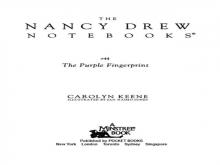 The Purple Fingerprint
The Purple Fingerprint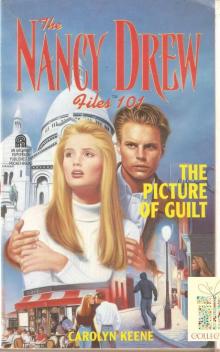 The Picture of Guilt
The Picture of Guilt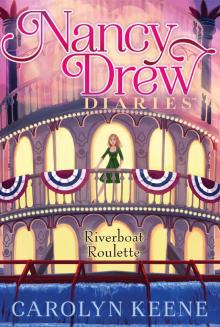 Riverboat Roulette
Riverboat Roulette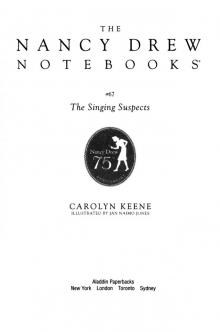 The Singing Suspects
The Singing Suspects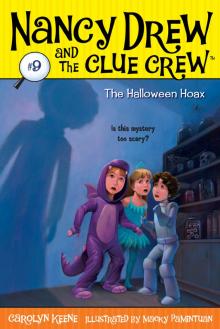 The Halloween Hoax
The Halloween Hoax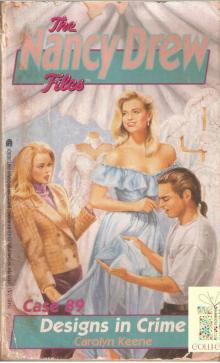 089 Designs in Crime
089 Designs in Crime The Hidden Treasures
The Hidden Treasures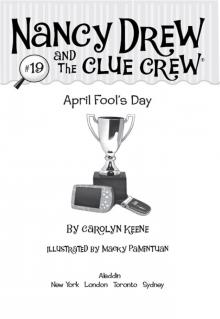 April Fool's Day
April Fool's Day The Black Widow
The Black Widow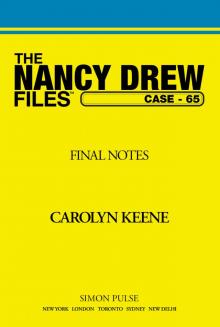 Final Notes
Final Notes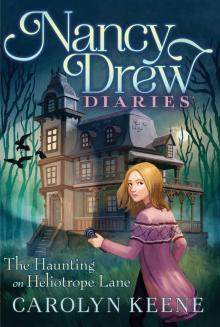 The Haunting on Heliotrope Lane
The Haunting on Heliotrope Lane The Runaway Bride
The Runaway Bride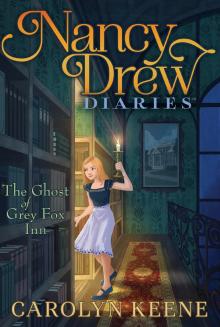 The Ghost of Grey Fox Inn
The Ghost of Grey Fox Inn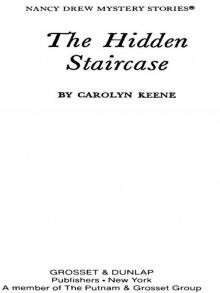 The Hidden Staircase
The Hidden Staircase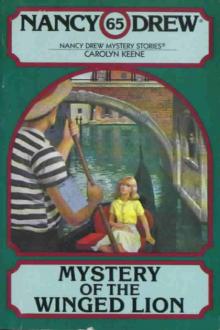 Mystery of the Winged Lion
Mystery of the Winged Lion Over the Edge
Over the Edge The Circus Scare
The Circus Scare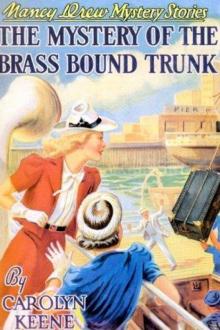 The Mystery of the Brass-Bound Trunk
The Mystery of the Brass-Bound Trunk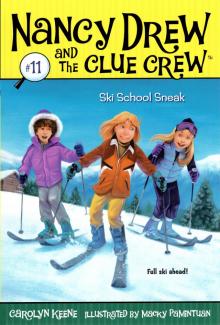 Ski School Sneak
Ski School Sneak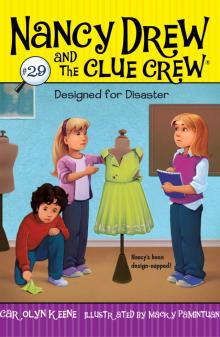 Designed for Disaster
Designed for Disaster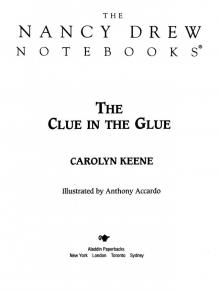 The Clue in the Glue
The Clue in the Glue Cold as Ice
Cold as Ice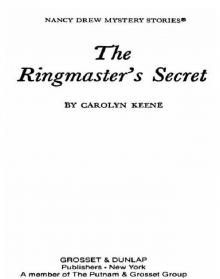 The Ringmaster's Secret
The Ringmaster's Secret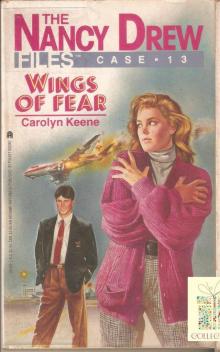 013 Wings of Fear
013 Wings of Fear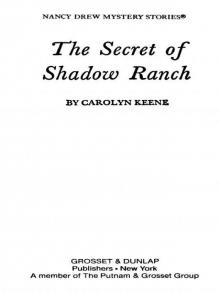 The Secret of Shadow Ranch
The Secret of Shadow Ranch Not Nice on Ice
Not Nice on Ice Earth Day Escapade
Earth Day Escapade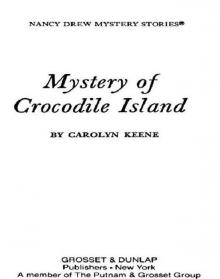 Mystery of Crocodile Island
Mystery of Crocodile Island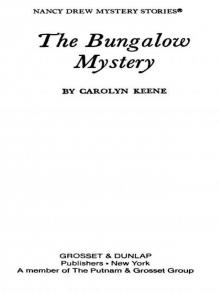 The Bungalow Mystery
The Bungalow Mystery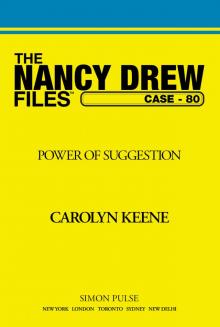 Power of Suggestion
Power of Suggestion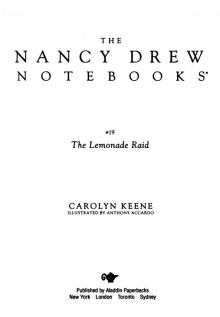 The Lemonade Raid
The Lemonade Raid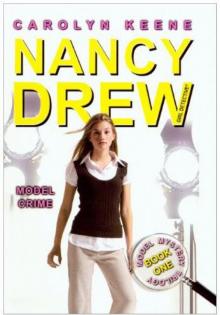 Model Crime
Model Crime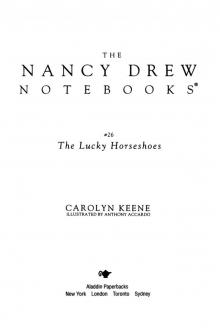 The Lucky Horseshoes
The Lucky Horseshoes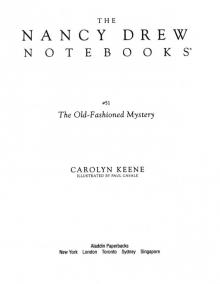 The Secret of the Old Clock
The Secret of the Old Clock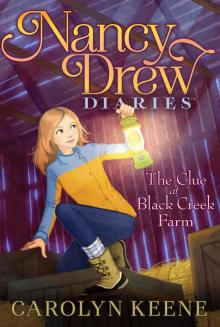 The Clue at Black Creek Farm
The Clue at Black Creek Farm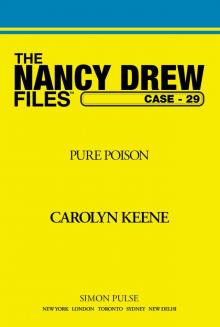 Pure Poison
Pure Poison Nobody's Business
Nobody's Business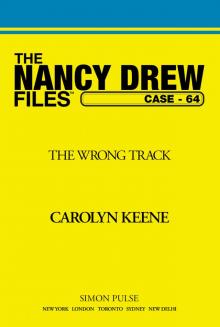 Wrong Track
Wrong Track Chick-Napped!
Chick-Napped!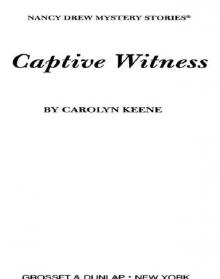 Captive Witness
Captive Witness If Looks Could Kill
If Looks Could Kill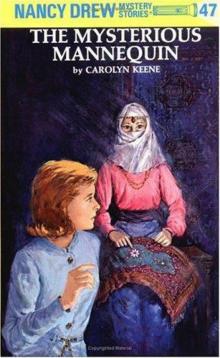 The Mysterious Mannequin
The Mysterious Mannequin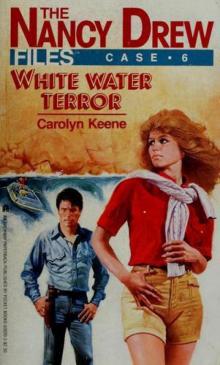 White Water Terror
White Water Terror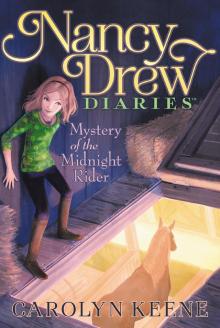 Mystery of the Midnight Rider
Mystery of the Midnight Rider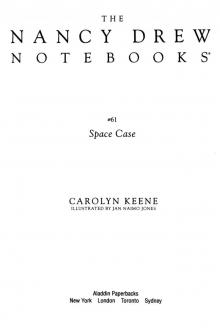 Space Case
Space Case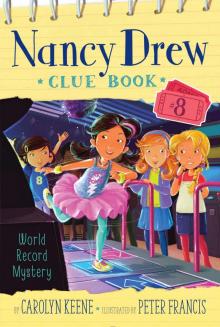 World Record Mystery
World Record Mystery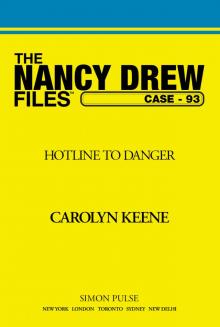 Hotline to Danger
Hotline to Danger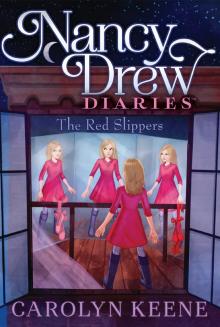 The Red Slippers
The Red Slippers A Crime for Christmas
A Crime for Christmas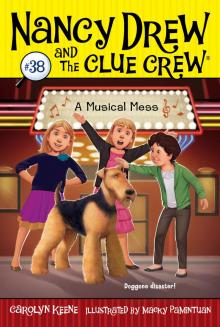 A Musical Mess
A Musical Mess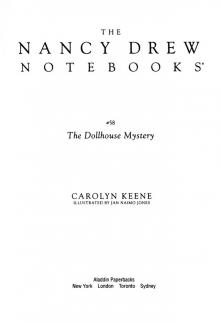 The Dollhouse Mystery
The Dollhouse Mystery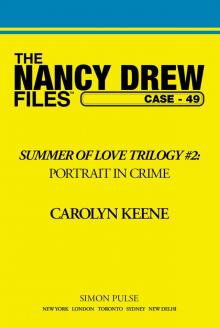 Portrait in Crime
Portrait in Crime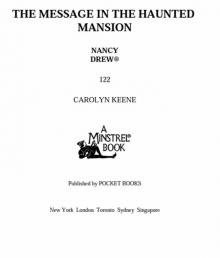 The Message in the Haunted Mansion
The Message in the Haunted Mansion Playing With Fire
Playing With Fire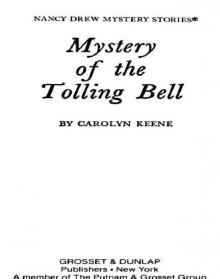 Mystery of the Tolling Bell
Mystery of the Tolling Bell Cutting Edge
Cutting Edge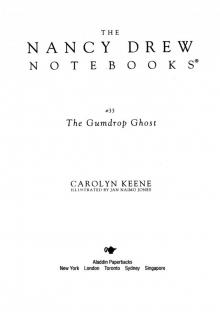 The Gumdrop Ghost
The Gumdrop Ghost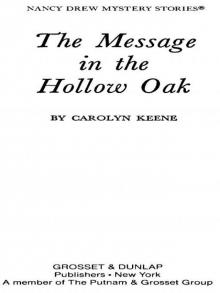 The Message in the Hollow Oak
The Message in the Hollow Oak Trial by Fire
Trial by Fire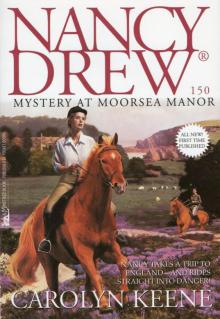 Mystery at Moorsea Manor
Mystery at Moorsea Manor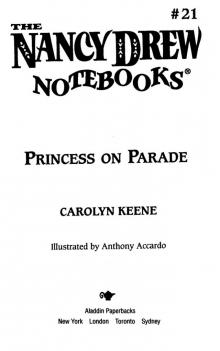 Princess on Parade
Princess on Parade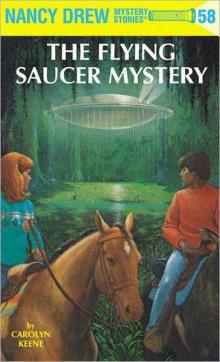 The Flying Saucer Mystery
The Flying Saucer Mystery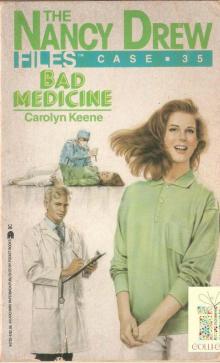 035 Bad Medicine
035 Bad Medicine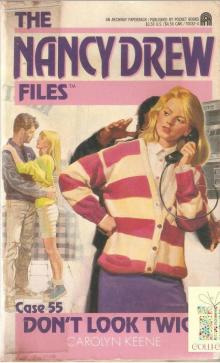 055 Don't Look Twice
055 Don't Look Twice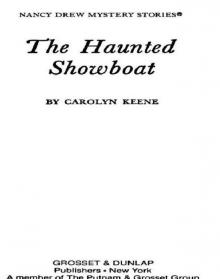 The Haunted Showboat
The Haunted Showboat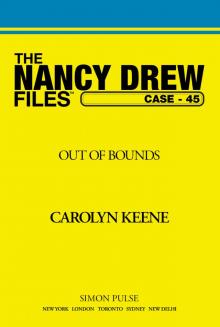 Out of Bounds
Out of Bounds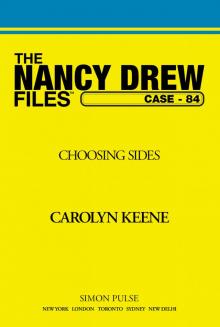 Choosing Sides
Choosing Sides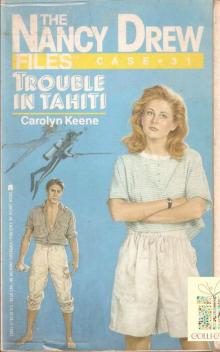 031 Trouble in Tahiti
031 Trouble in Tahiti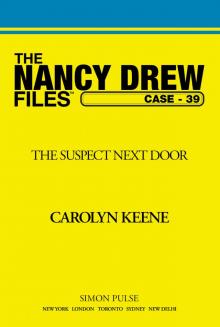 The Suspect Next Door
The Suspect Next Door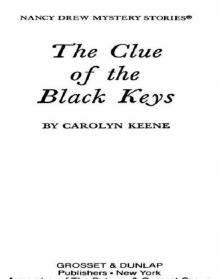 The Clue of the Black Keys
The Clue of the Black Keys The Secret Santa
The Secret Santa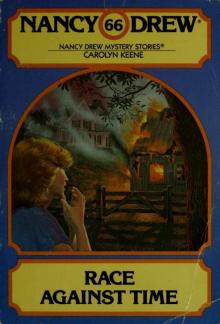 Race Against Time
Race Against Time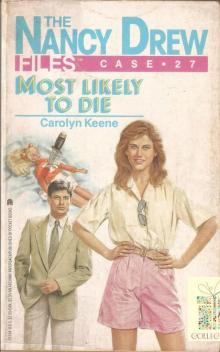 027 Most Likely to Die
027 Most Likely to Die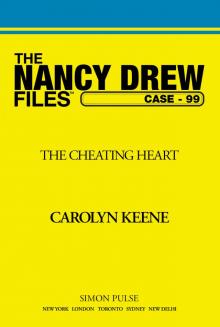 The Cheating Heart
The Cheating Heart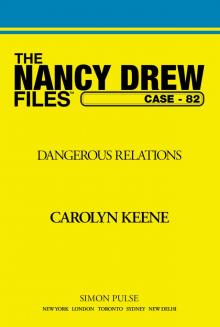 Dangerous Relations
Dangerous Relations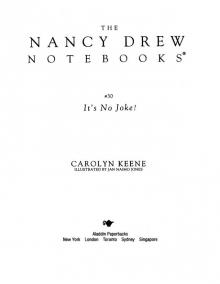 It's No Joke!
It's No Joke!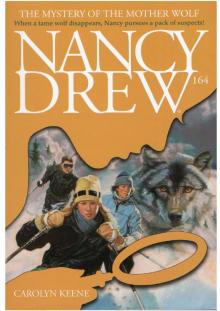 The Mystery of the Mother Wolf
The Mystery of the Mother Wolf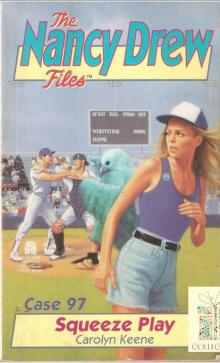 097 Squeeze Play
097 Squeeze Play Secret at Mystic Lake
Secret at Mystic Lake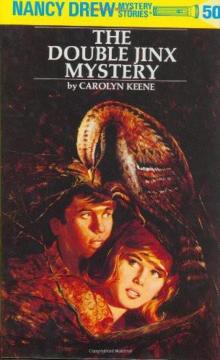 The Double Jinx Mystery
The Double Jinx Mystery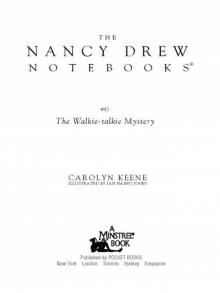 The Walkie Talkie Mystery
The Walkie Talkie Mystery The Case of the Vanishing Veil
The Case of the Vanishing Veil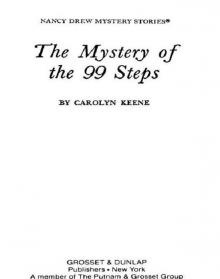 The Mystery of the 99 Steps
The Mystery of the 99 Steps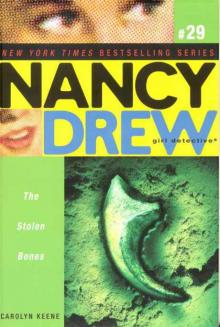 The Stolen Bones
The Stolen Bones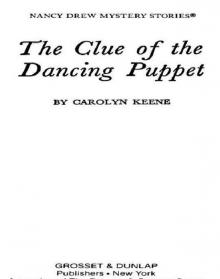 The Clue of the Dancing Puppet
The Clue of the Dancing Puppet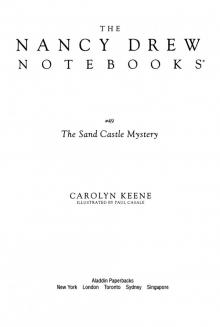 The Sand Castle Mystery
The Sand Castle Mystery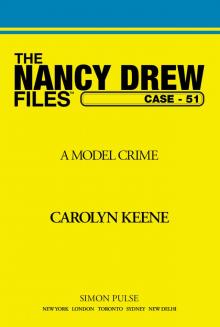 A Model Crime
A Model Crime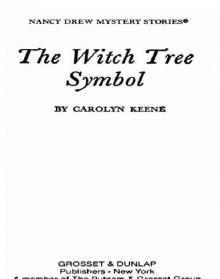 The Witch Tree Symbol
The Witch Tree Symbol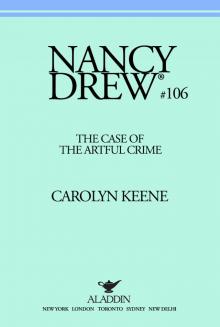 The Case of the Artful Crime
The Case of the Artful Crime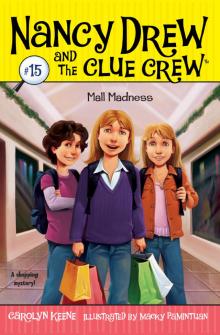 Mall Madness
Mall Madness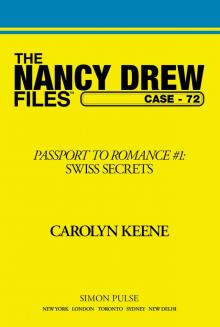 Swiss Secrets
Swiss Secrets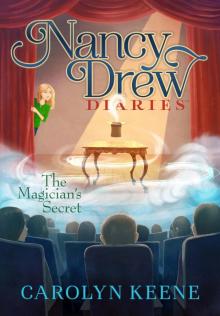 The Magician's Secret
The Magician's Secret Tall, Dark and Deadly
Tall, Dark and Deadly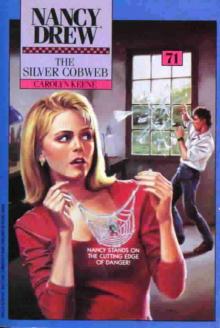 The Silver Cobweb
The Silver Cobweb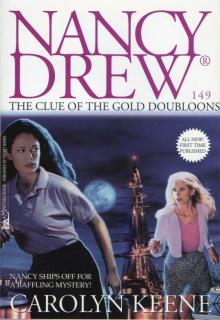 The Clue of the Gold Doubloons
The Clue of the Gold Doubloons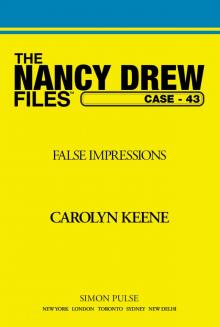 False Impressions
False Impressions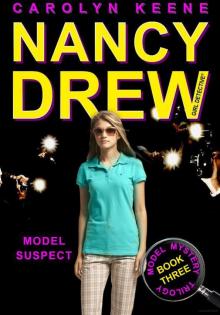 Model Suspect
Model Suspect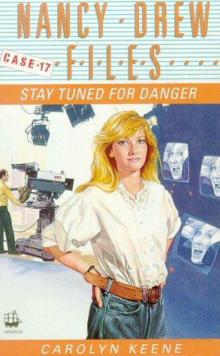 Stay Tuned for Danger
Stay Tuned for Danger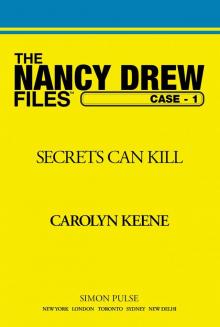 Secrets Can Kill
Secrets Can Kill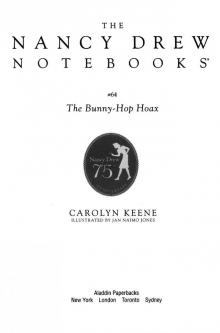 The Bunny-Hop Hoax
The Bunny-Hop Hoax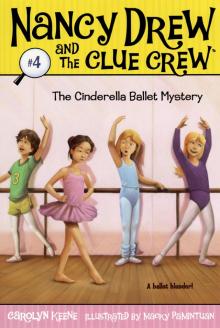 The Cinderella Ballet Mystery
The Cinderella Ballet Mystery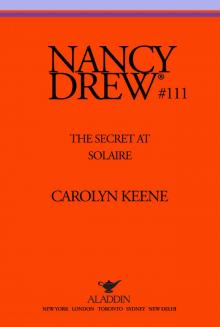 The Secret at Solaire
The Secret at Solaire Trash or Treasure?
Trash or Treasure?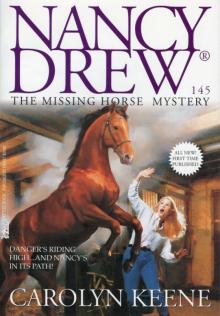 The Missing Horse Mystery
The Missing Horse Mystery The Lost Locket
The Lost Locket The Secret of the Wooden Lady
The Secret of the Wooden Lady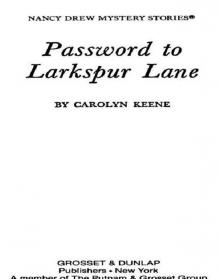 Password to Larkspur Lane
Password to Larkspur Lane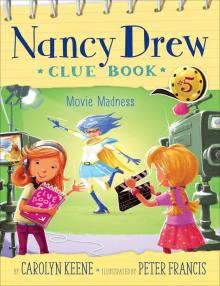 Movie Madness
Movie Madness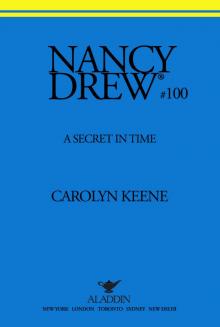 A Secret in Time
A Secret in Time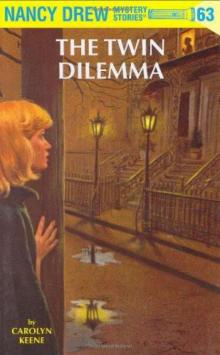 The Twin Dilemma
The Twin Dilemma Candy Is Dandy
Candy Is Dandy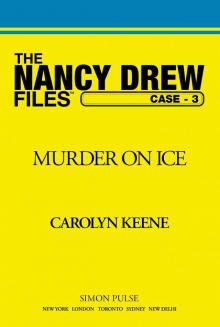 Murder on Ice
Murder on Ice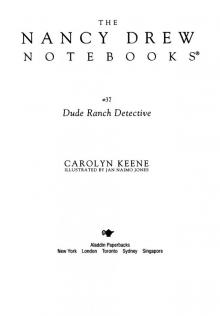 Dude Ranch Detective
Dude Ranch Detective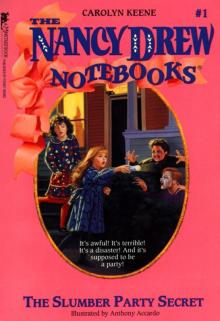 The Slumber Party Secret
The Slumber Party Secret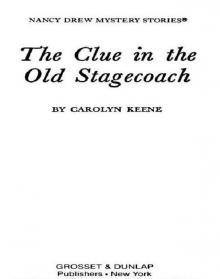 The Clue in the Old Stagecoach
The Clue in the Old Stagecoach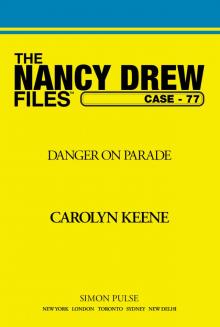 Danger on Parade
Danger on Parade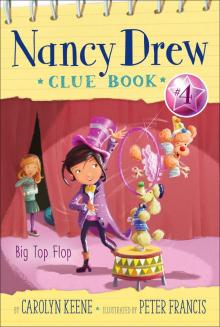 Big Top Flop
Big Top Flop Strangers on a Train
Strangers on a Train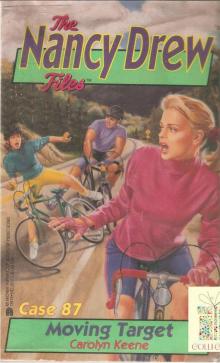 087 Moving Target
087 Moving Target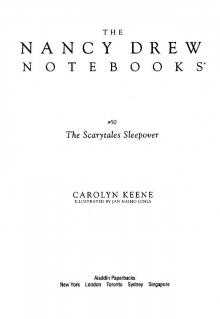 The Scarytales Sleepover
The Scarytales Sleepover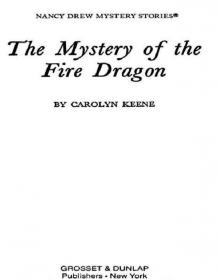 The Mystery of the Fire Dragon
The Mystery of the Fire Dragon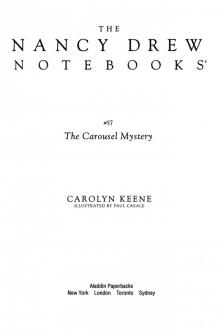 The Carousel Mystery
The Carousel Mystery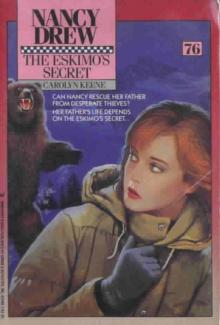 The Eskimo's Secret
The Eskimo's Secret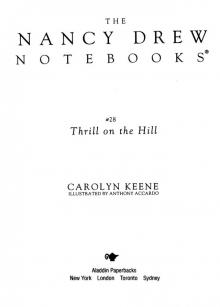 Thrill on the Hill
Thrill on the Hill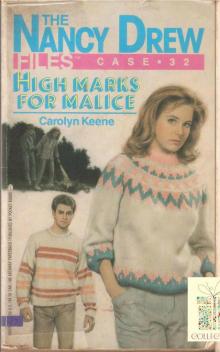 032 High Marks for Malice
032 High Marks for Malice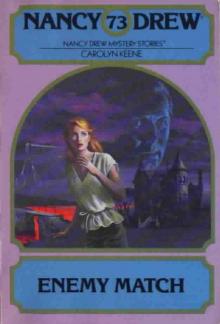 Enemy Match
Enemy Match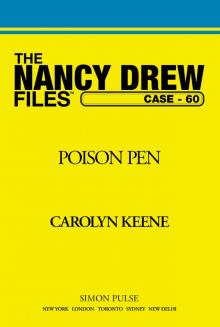 Poison Pen
Poison Pen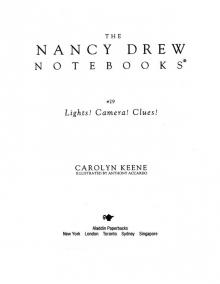 Lights, Camera . . . Cats!
Lights, Camera . . . Cats! Lost in the Everglades
Lost in the Everglades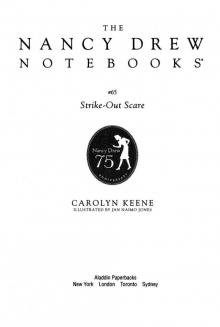 Strike-Out Scare
Strike-Out Scare Third-Grade Reporter
Third-Grade Reporter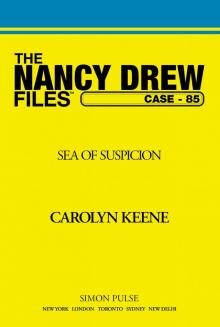 Sea of Suspicion
Sea of Suspicion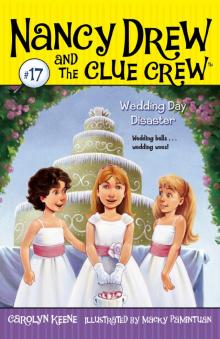 Wedding Day Disaster
Wedding Day Disaster The Make-A-Pet Mystery
The Make-A-Pet Mystery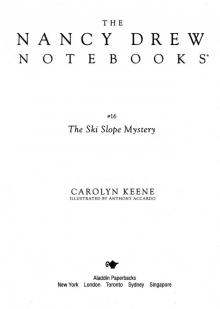 The Ski Slope Mystery
The Ski Slope Mystery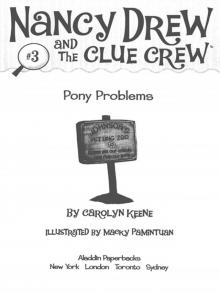 Pony Problems
Pony Problems Candy Kingdom Chaos
Candy Kingdom Chaos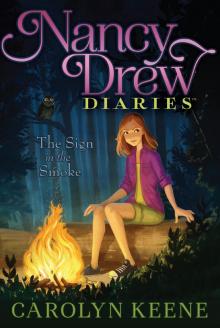 The Sign in the Smoke
The Sign in the Smoke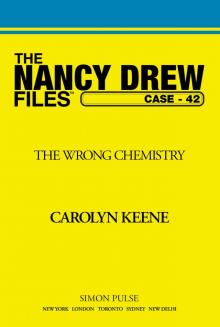 The Wrong Chemistry
The Wrong Chemistry Circus Act
Circus Act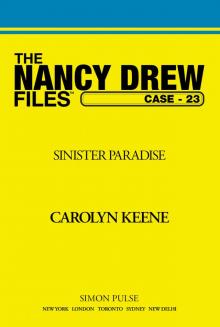 Sinister Paradise
Sinister Paradise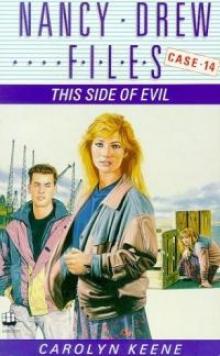 This Side of Evil
This Side of Evil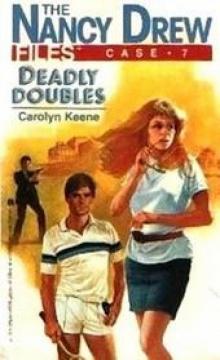 Deadly Doubles
Deadly Doubles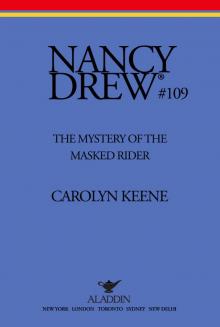 The Mystery of the Masked Rider
The Mystery of the Masked Rider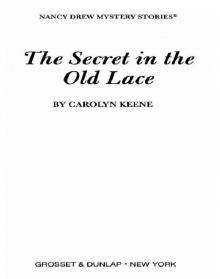 The Secret in the Old Lace
The Secret in the Old Lace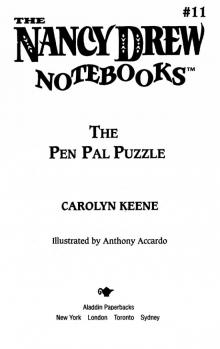 The Pen Pal Puzzle
The Pen Pal Puzzle Without a Trace
Without a Trace Whose Pet Is Best?
Whose Pet Is Best?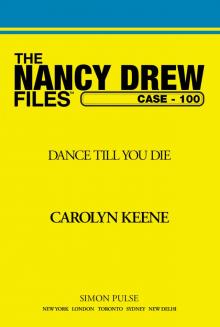 Dance Till You Die
Dance Till You Die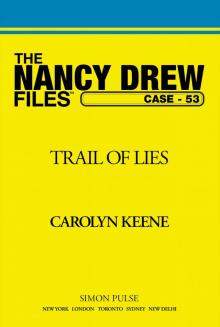 Trail of Lies
Trail of Lies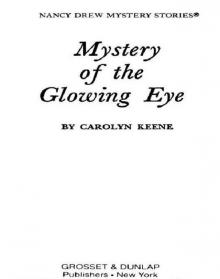 Mystery of the Glowing Eye
Mystery of the Glowing Eye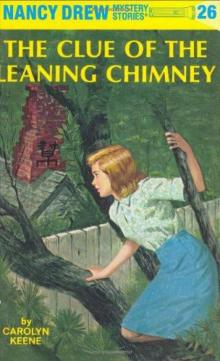 The Clue of the Leaning Chimney
The Clue of the Leaning Chimney The Crook Who Took the Book
The Crook Who Took the Book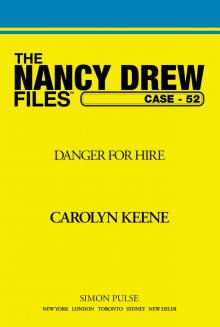 Danger for Hire
Danger for Hire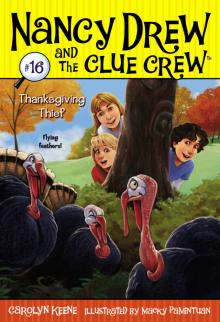 Thanksgiving Thief
Thanksgiving Thief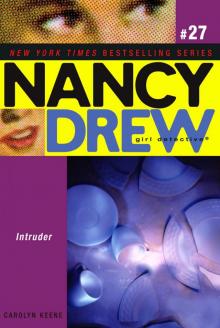 Intruder!
Intruder!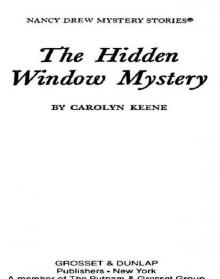 The Hidden Window Mystery
The Hidden Window Mystery Win, Place or Die
Win, Place or Die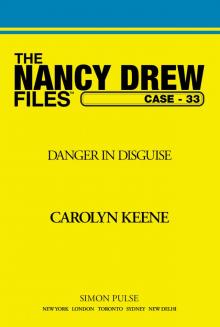 Danger in Disguise
Danger in Disguise The Best Detective
The Best Detective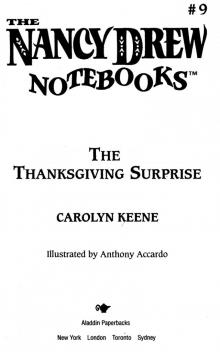 The Thanksgiving Surprise
The Thanksgiving Surprise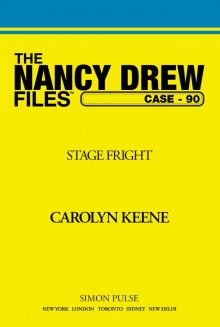 Stage Fright
Stage Fright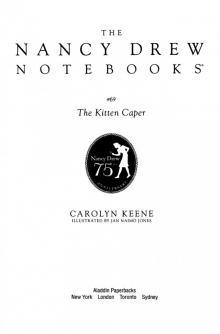 The Kitten Caper
The Kitten Caper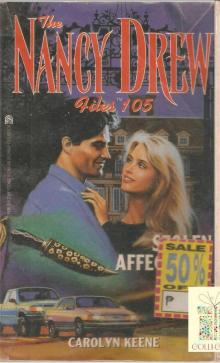 Stolen Affections
Stolen Affections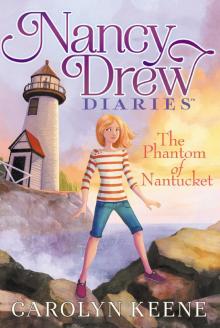 The Phantom of Nantucket
The Phantom of Nantucket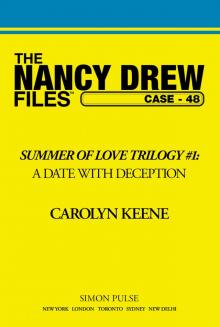 Date With Deception
Date With Deception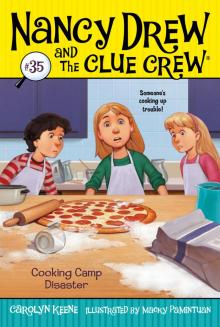 Cooking Camp Disaster
Cooking Camp Disaster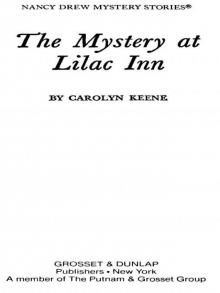 The Mystery at Lilac Inn
The Mystery at Lilac Inn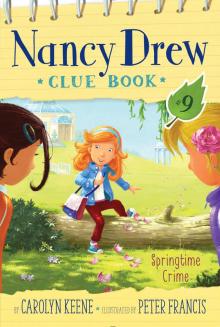 Springtime Crime
Springtime Crime Action!
Action! Into Thin Air
Into Thin Air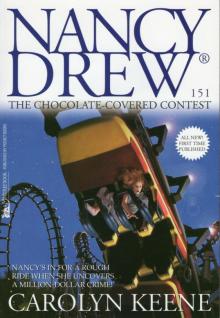 The Chocolate-Covered Contest
The Chocolate-Covered Contest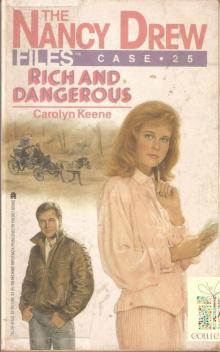 025 Rich and Dangerous
025 Rich and Dangerous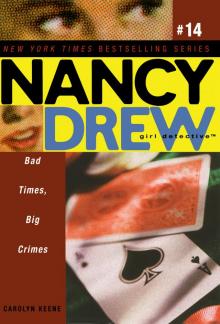 Bad Times, Big Crimes
Bad Times, Big Crimes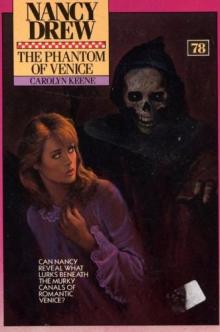 078 The Phantom Of Venice
078 The Phantom Of Venice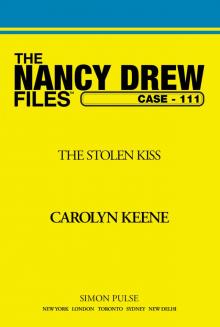 The Stolen Kiss
The Stolen Kiss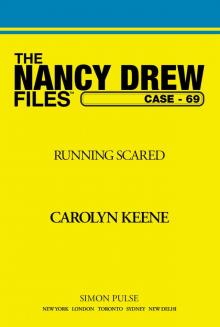 Running Scared
Running Scared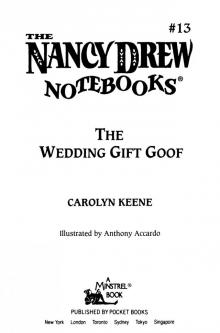 The Wedding Gift Goof
The Wedding Gift Goof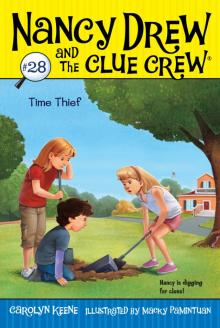 Time Thief
Time Thief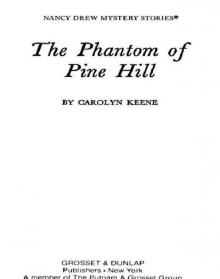 The Phantom of Pine Hill
The Phantom of Pine Hill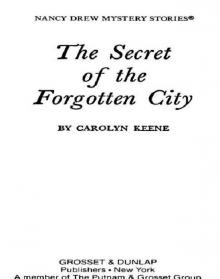 The Secret of the Forgotten City
The Secret of the Forgotten City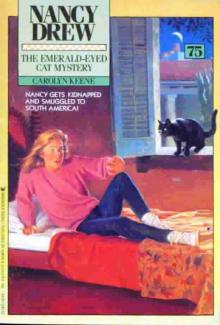 The Emerald-Eyed Cat Mystery
The Emerald-Eyed Cat Mystery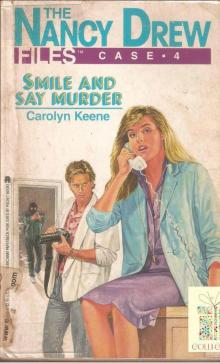 004 Smile and Say Murder
004 Smile and Say Murder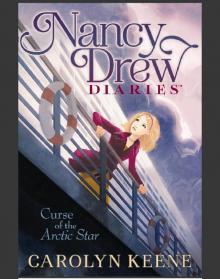 Curse of the Arctic Star
Curse of the Arctic Star Dinosaur Alert!
Dinosaur Alert!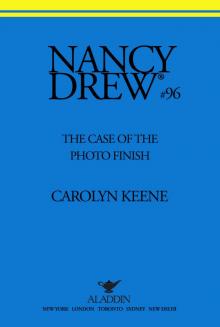 The Case of the Photo Finish
The Case of the Photo Finish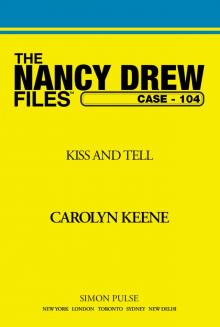 Kiss and Tell
Kiss and Tell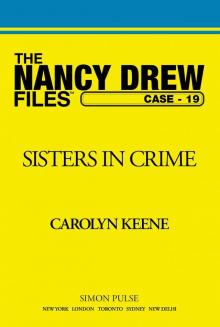 Sisters in Crime
Sisters in Crime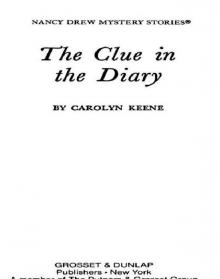 The Clue in the Diary
The Clue in the Diary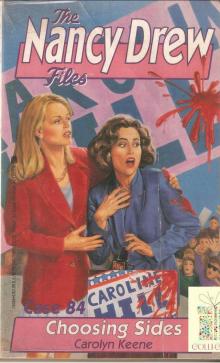 084 Choosing Sides
084 Choosing Sides Haunting of Horse Island
Haunting of Horse Island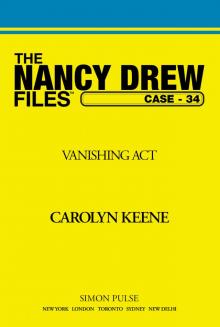 Vanishing Act
Vanishing Act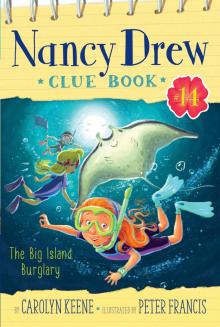 The Big Island Burglary
The Big Island Burglary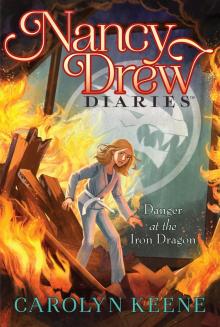 Danger at the Iron Dragon
Danger at the Iron Dragon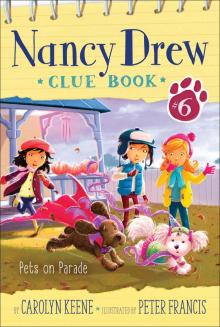 Pets on Parade
Pets on Parade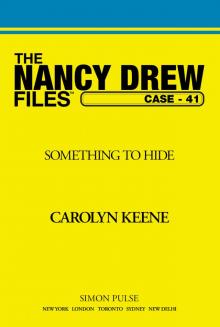 Something to Hide
Something to Hide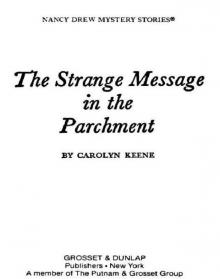 The Strange Message in the Parchment
The Strange Message in the Parchment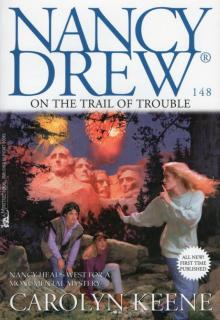 On the Trail of Trouble
On the Trail of Trouble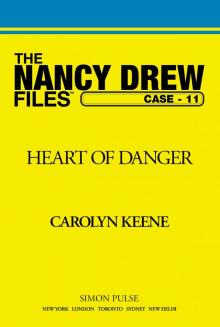 Heart of Danger
Heart of Danger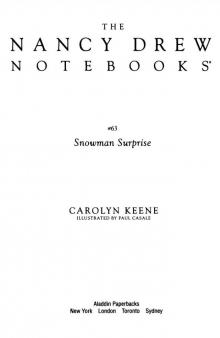 The Snowman Surprise
The Snowman Surprise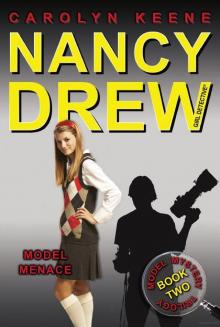 Model Menace
Model Menace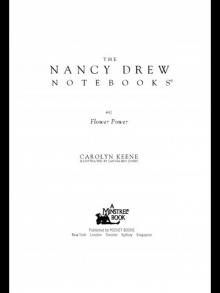 Flower Power
Flower Power The Great Goat Gaffe
The Great Goat Gaffe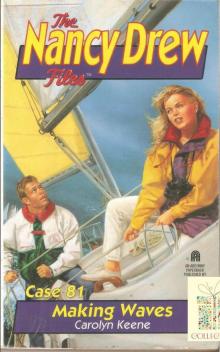 081 Making Waves
081 Making Waves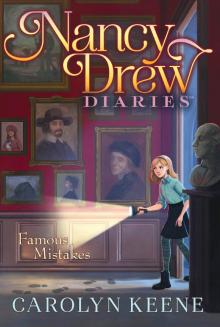 Famous Mistakes
Famous Mistakes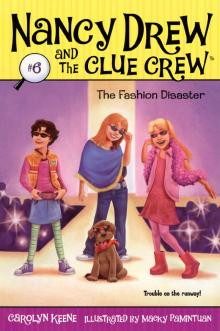 The Fashion Disaster
The Fashion Disaster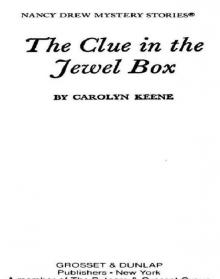 The Clue in the Jewel Box
The Clue in the Jewel Box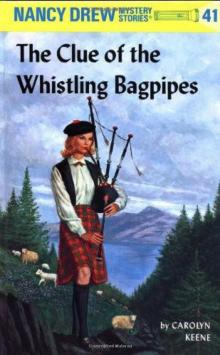 The Clue of the Whistling Bagpipes
The Clue of the Whistling Bagpipes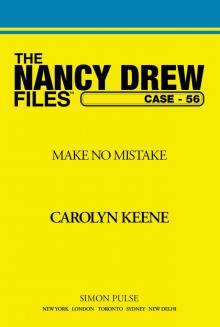 Make No Mistake
Make No Mistake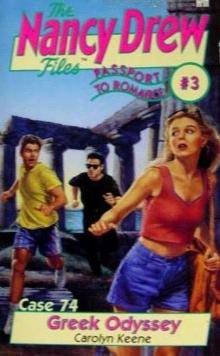 Greek Odyssey
Greek Odyssey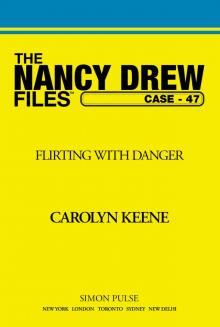 Flirting With Danger
Flirting With Danger Double Take
Double Take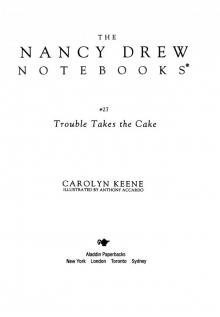 Trouble Takes the Cake
Trouble Takes the Cake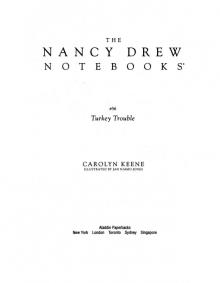 Turkey Trouble
Turkey Trouble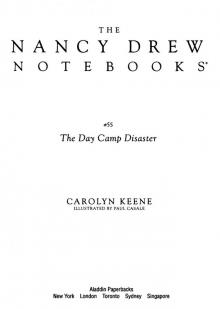 The Day Camp Disaster
The Day Camp Disaster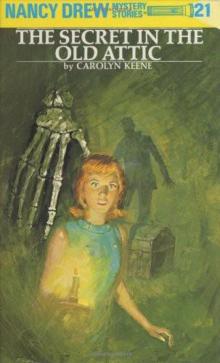 The Secret in the Old Attic
The Secret in the Old Attic The Baby-Sitter Burglaries
The Baby-Sitter Burglaries Recipe for Murder
Recipe for Murder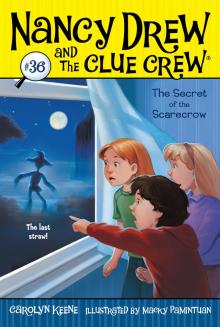 The Secret of the Scarecrow
The Secret of the Scarecrow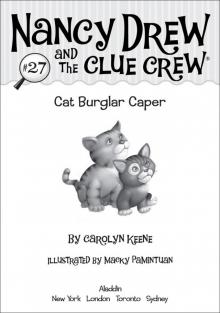 Cat Burglar Caper
Cat Burglar Caper Turkey Trot Plot
Turkey Trot Plot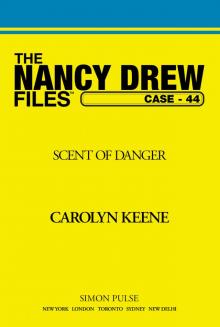 Scent of Danger
Scent of Danger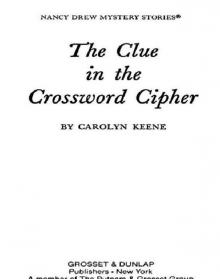 The Clue in the Crossword Cipher
The Clue in the Crossword Cipher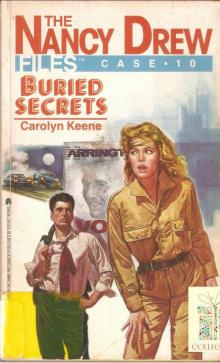 010 Buried Secrets
010 Buried Secrets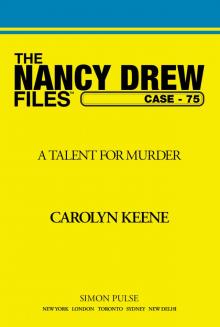 A Talent for Murder
A Talent for Murder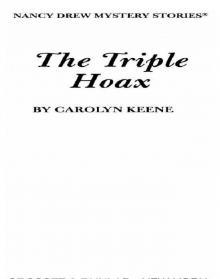 The Triple Hoax
The Triple Hoax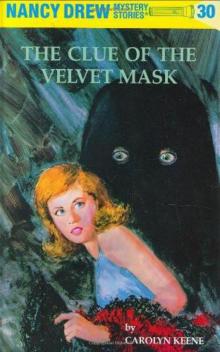 The Clue of the Velvet Mask
The Clue of the Velvet Mask Last Lemonade Standing
Last Lemonade Standing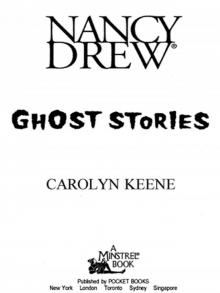 The Ghost of Blackwood Hall
The Ghost of Blackwood Hall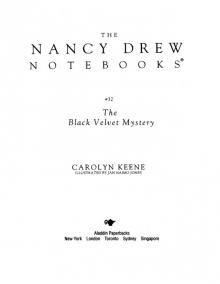 The Black Velvet Mystery
The Black Velvet Mystery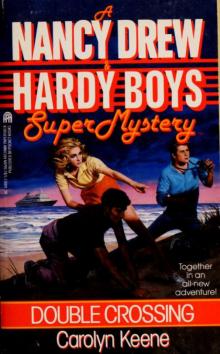 Double Crossing
Double Crossing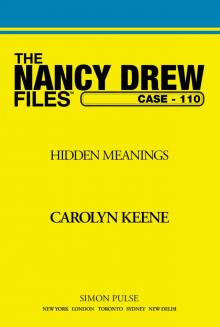 Hidden Meanings
Hidden Meanings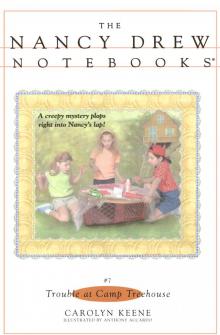 Trouble at Camp Treehouse
Trouble at Camp Treehouse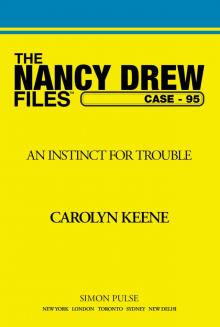 An Instinct for Trouble
An Instinct for Trouble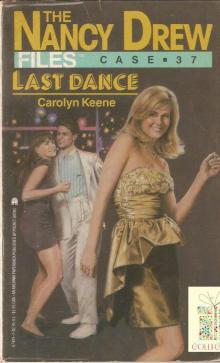 037 Last Dance
037 Last Dance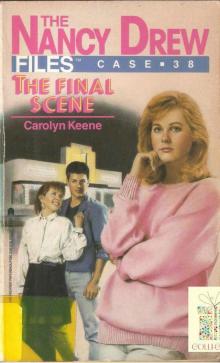 038 The Final Scene
038 The Final Scene Duck Derby Debacle
Duck Derby Debacle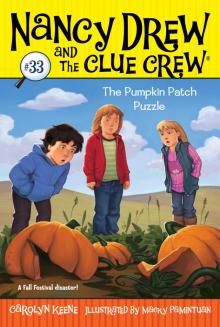 The Pumpkin Patch Puzzle
The Pumpkin Patch Puzzle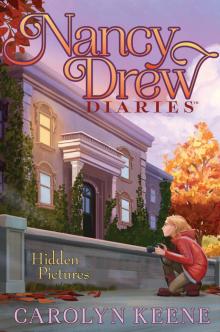 Hidden Pictures
Hidden Pictures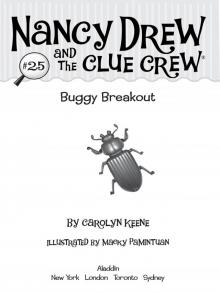 Buggy Breakout
Buggy Breakout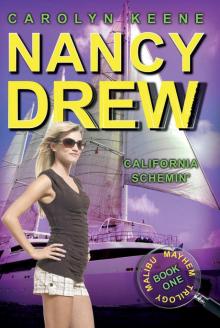 California Schemin'
California Schemin'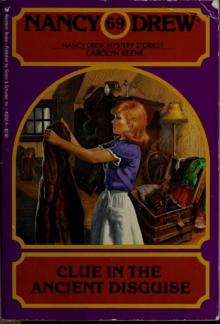 Clue in the Ancient Disguise
Clue in the Ancient Disguise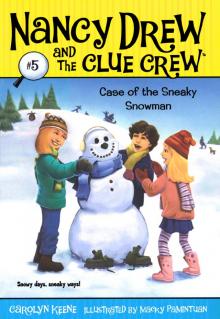 Case of the Sneaky Snowman
Case of the Sneaky Snowman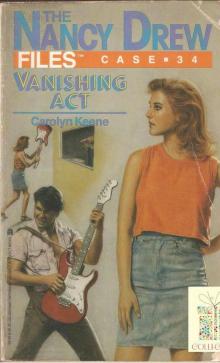 034 Vanishing Act
034 Vanishing Act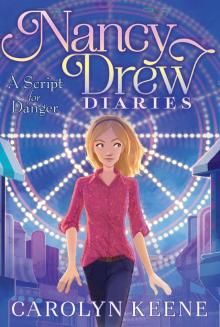 A Script for Danger
A Script for Danger The Flower Show Fiasco
The Flower Show Fiasco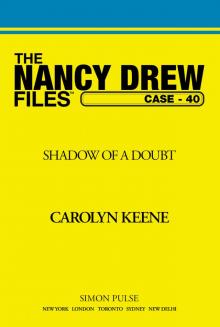 Shadow of a Doubt
Shadow of a Doubt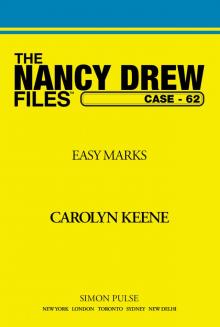 Easy Marks
Easy Marks Alien in the Classroom
Alien in the Classroom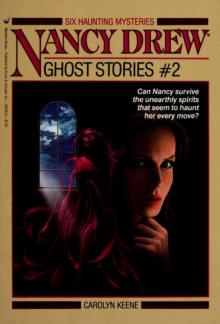 Ghost Stories, #2 (Nancy Drew)
Ghost Stories, #2 (Nancy Drew)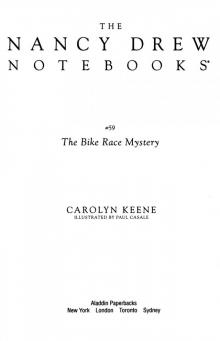 The Bike Race Mystery
The Bike Race Mystery False Pretenses
False Pretenses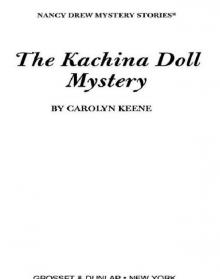 The Kachina Doll Mystery
The Kachina Doll Mystery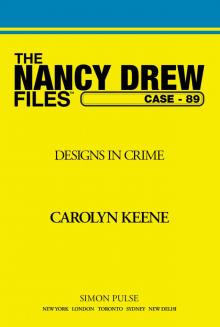 Designs in Crime
Designs in Crime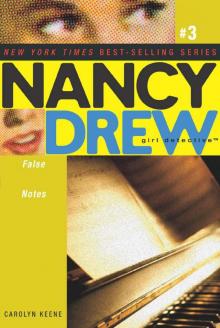 False Notes
False Notes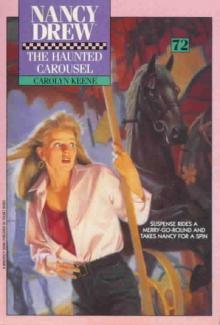 The Haunted Carousel
The Haunted Carousel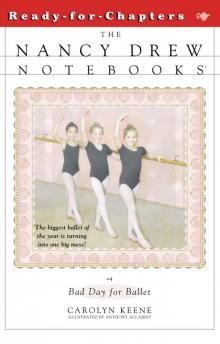 Bad Day for Ballet
Bad Day for Ballet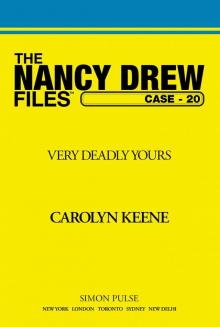 Very Deadly Yours
Very Deadly Yours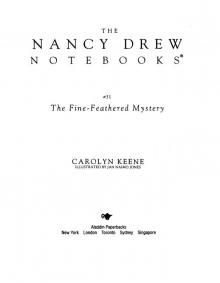 The Fine-Feathered Mystery
The Fine-Feathered Mystery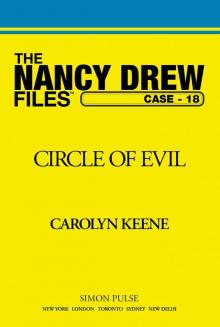 Circle of Evil
Circle of Evil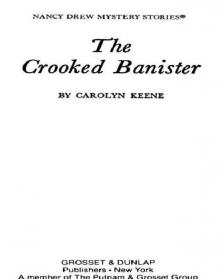 The Crooked Banister
The Crooked Banister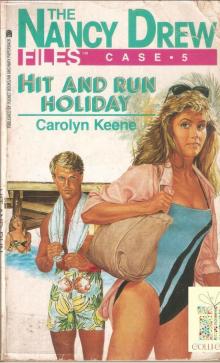 005 Hit and Run Holiday
005 Hit and Run Holiday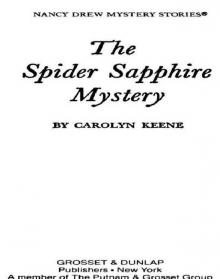 The Spider Sapphire Mystery
The Spider Sapphire Mystery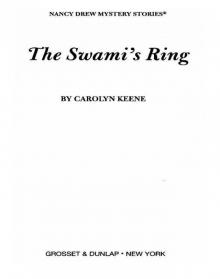 The Swami's Ring
The Swami's Ring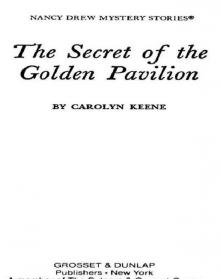 The Secret of the Golden Pavilion
The Secret of the Golden Pavilion Recipe for Trouble
Recipe for Trouble Betrayed by Love
Betrayed by Love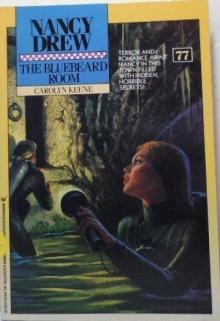 The Bluebeard Room
The Bluebeard Room Sweet Revenge
Sweet Revenge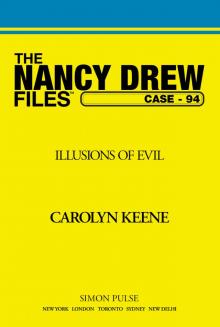 Illusions of Evil
Illusions of Evil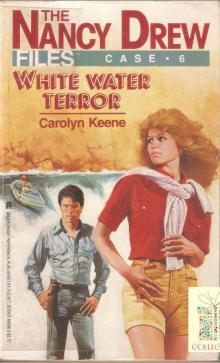 006 White Water Terror
006 White Water Terror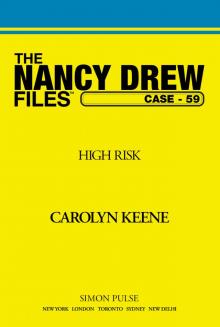 High Risk
High Risk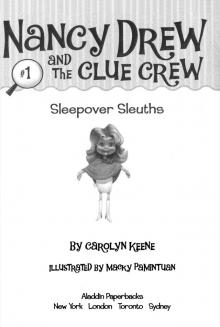 Sleepover Sleuths
Sleepover Sleuths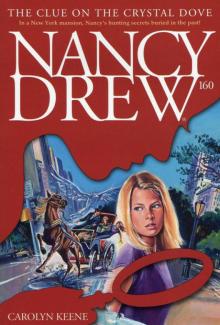 The Clue on the Crystal Dove
The Clue on the Crystal Dove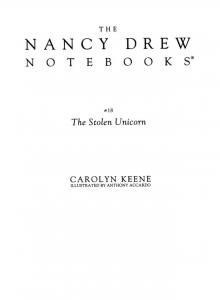 The Stolen Unicorn
The Stolen Unicorn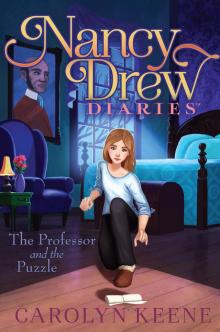 The Professor and the Puzzle
The Professor and the Puzzle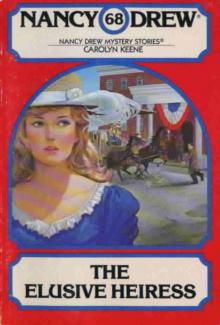 The Elusive Heiress
The Elusive Heiress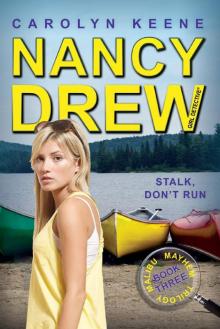 Stalk, Don't Run
Stalk, Don't Run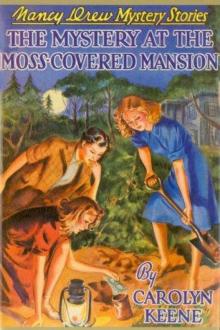 The Mystery at the Moss-Covered Mansion
The Mystery at the Moss-Covered Mansion The Tortoise and the Scare
The Tortoise and the Scare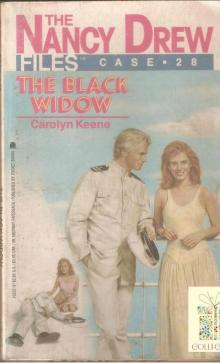 028 The Black Widow
028 The Black Widow Big Worry in Wonderland
Big Worry in Wonderland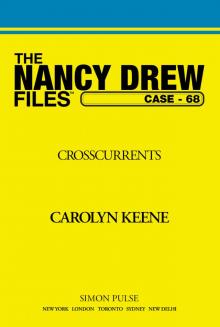 Crosscurrents
Crosscurrents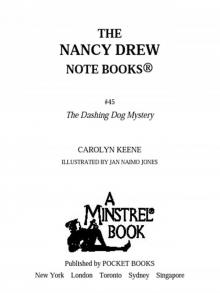 The Dashing Dog Mystery
The Dashing Dog Mystery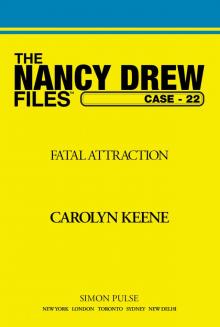 Fatal Attraction
Fatal Attraction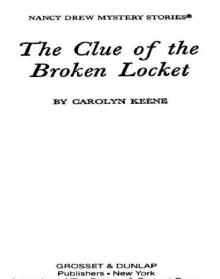 The Clue of the Broken Locket
The Clue of the Broken Locket The Stinky Cheese Surprise
The Stinky Cheese Surprise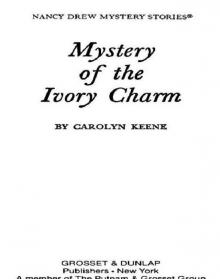 Mystery of the Ivory Charm
Mystery of the Ivory Charm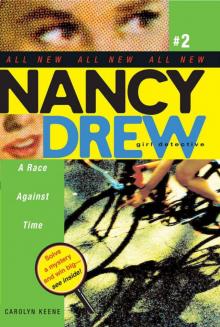 A Race Against Time
A Race Against Time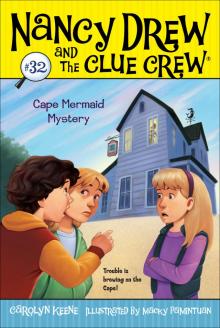 Cape Mermaid Mystery
Cape Mermaid Mystery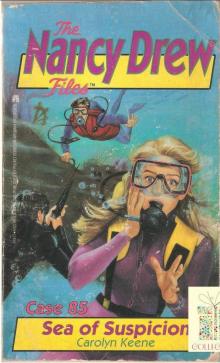 085 Sea of Suspicion
085 Sea of Suspicion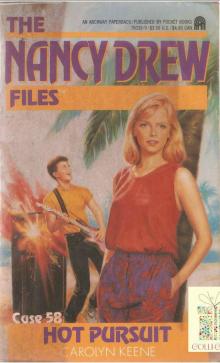 058 Hot Pursuit
058 Hot Pursuit The Secret in the Spooky Woods
The Secret in the Spooky Woods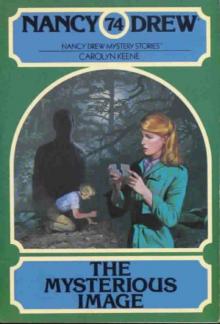 The Mysterious Image
The Mysterious Image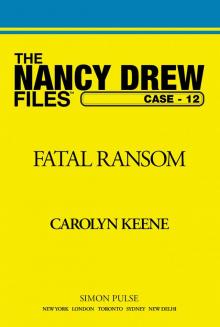 Fatal Ransom
Fatal Ransom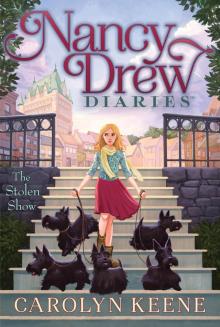 The Stolen Show
The Stolen Show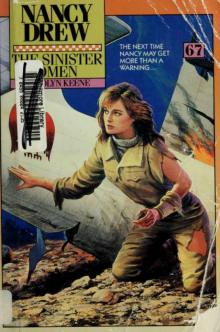 The Sinister Omen
The Sinister Omen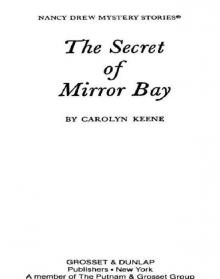 The Secret of Mirror Bay
The Secret of Mirror Bay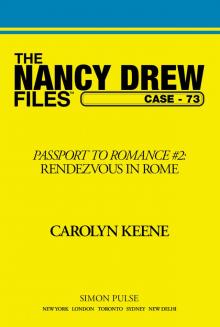 Rendezvous in Rome
Rendezvous in Rome The Perfect Plot
The Perfect Plot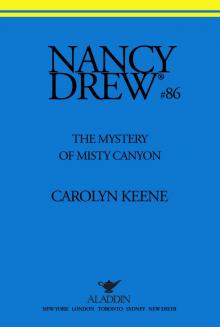 The Mystery of Misty Canyon
The Mystery of Misty Canyon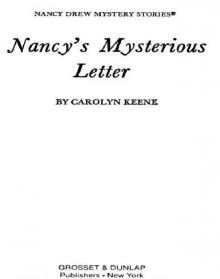 Nancy's Mysterious Letter
Nancy's Mysterious Letter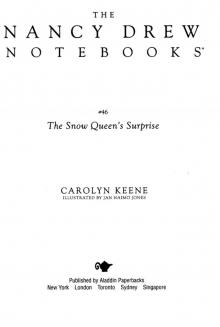 The Snow Queen's Surprise
The Snow Queen's Surprise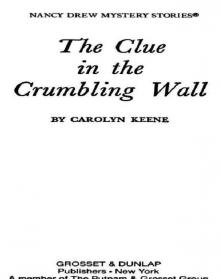 The Clue in the Crumbling Wall
The Clue in the Crumbling Wall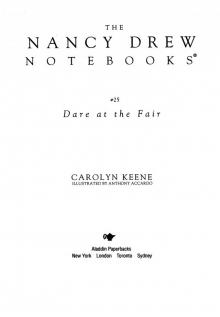 Dare at the Fair
Dare at the Fair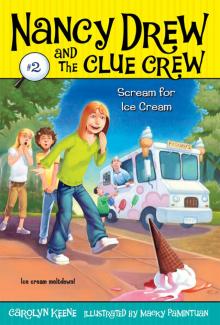 Scream for Ice Cream
Scream for Ice Cream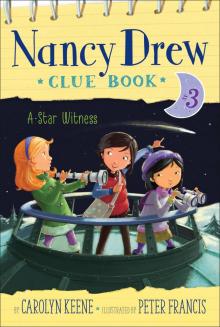 A Star Witness
A Star Witness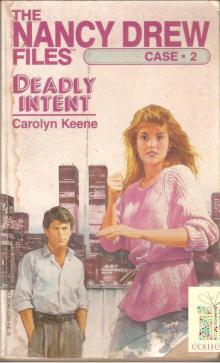 002 Deadly Intent
002 Deadly Intent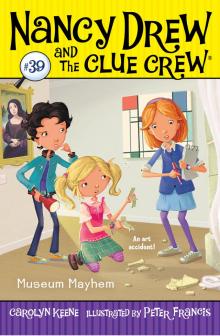 Museum Mayhem
Museum Mayhem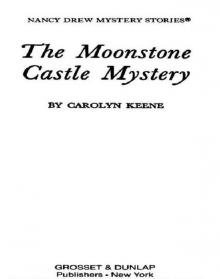 The Moonstone Castle Mystery
The Moonstone Castle Mystery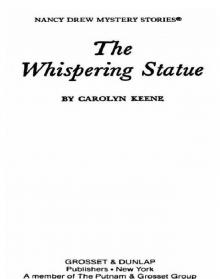 The Whispering Statue
The Whispering Statue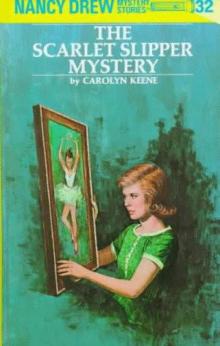 The Scarlet Slipper Mystery
The Scarlet Slipper Mystery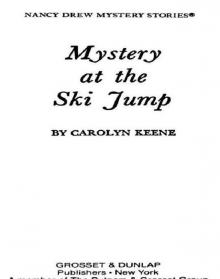 Mystery at the Ski Jump
Mystery at the Ski Jump Hot Pursuit
Hot Pursuit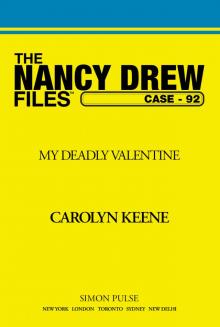 My Deadly Valentine
My Deadly Valentine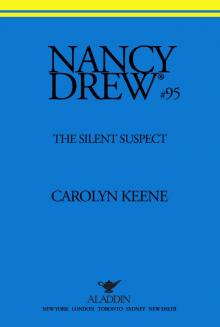 The Silent Suspect
The Silent Suspect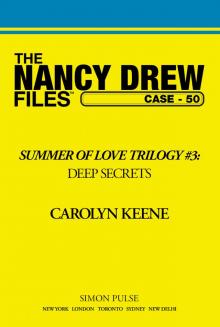 Deep Secrets
Deep Secrets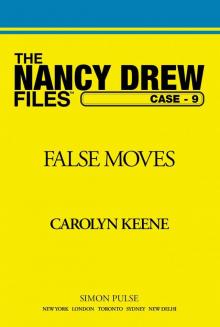 False Moves
False Moves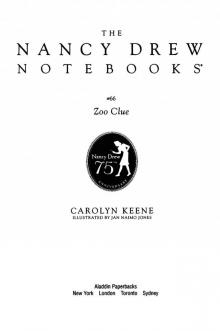 The Zoo Crew
The Zoo Crew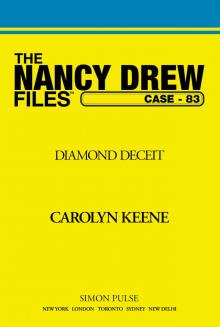 Diamond Deceit
Diamond Deceit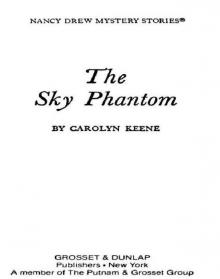 The Sky Phantom
The Sky Phantom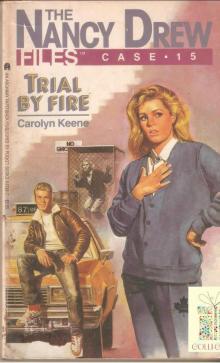 015 Trial by Fire
015 Trial by Fire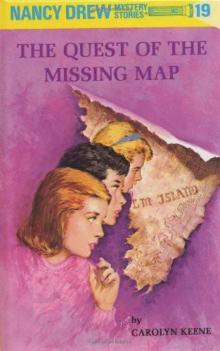 The Quest of the Missing Map
The Quest of the Missing Map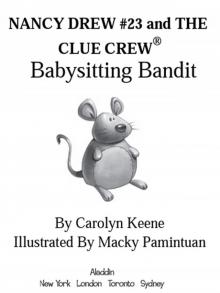 Babysitting Bandit
Babysitting Bandit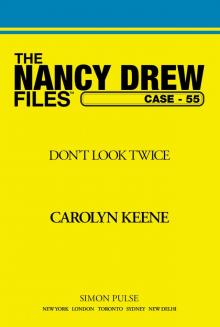 Don't Look Twice
Don't Look Twice Never Say Die
Never Say Die The Soccer Shoe Clue
The Soccer Shoe Clue Pool Party Puzzler
Pool Party Puzzler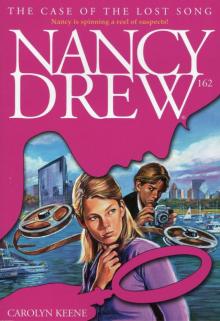 The Case of the Lost Song
The Case of the Lost Song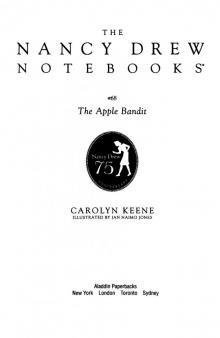 The Apple Bandit
The Apple Bandit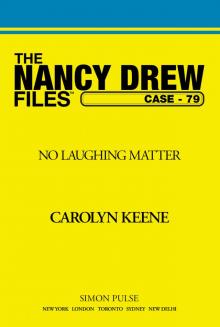 No Laughing Matter
No Laughing Matter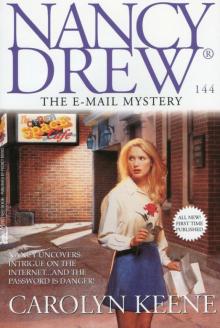 The Thirteenth Pearl
The Thirteenth Pearl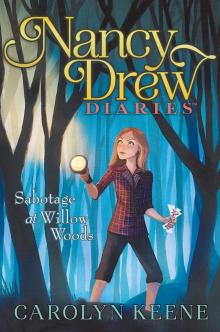 Sabotage at Willow Woods
Sabotage at Willow Woods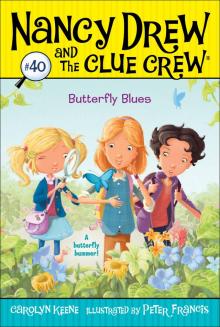 Butterfly Blues
Butterfly Blues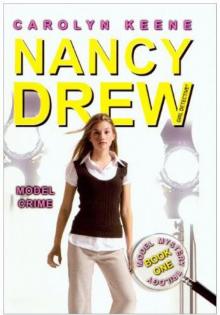 Model Crime 1
Model Crime 1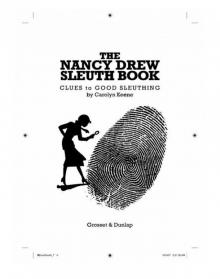 The Nancy Drew Sleuth Book
The Nancy Drew Sleuth Book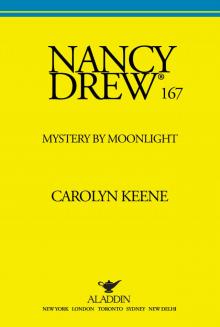 Mystery by Moonlight
Mystery by Moonlight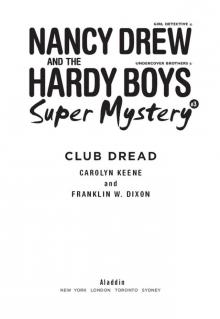 Club Dread
Club Dread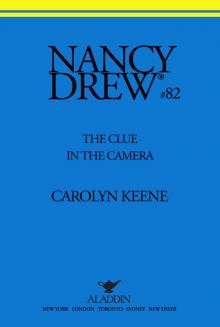 The Clue in the Camera
The Clue in the Camera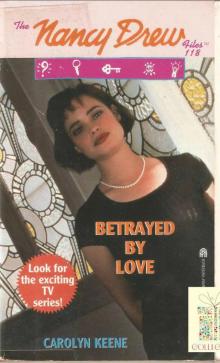 118 Betrayed By Love
118 Betrayed By Love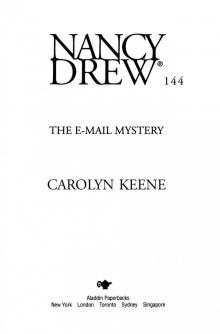 The E-Mail Mystery (Nancy Drew Book 144)
The E-Mail Mystery (Nancy Drew Book 144)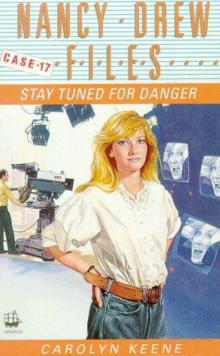 Stay Tuned for Danger: Circle of Evil
Stay Tuned for Danger: Circle of Evil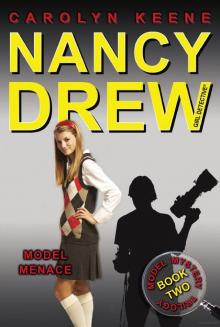 Model Menace 2
Model Menace 2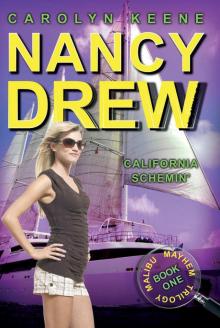 California Schemin': Book One in the Malibu Mayhem Trilogy
California Schemin': Book One in the Malibu Mayhem Trilogy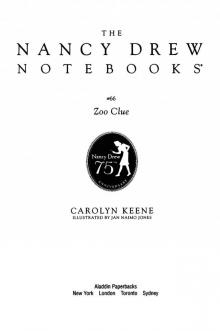 Zoo Clue (Nancy Drew Notebooks)
Zoo Clue (Nancy Drew Notebooks)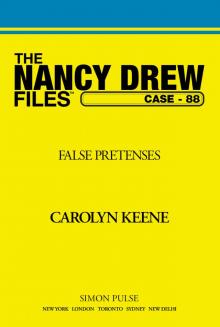 False Pretences
False Pretences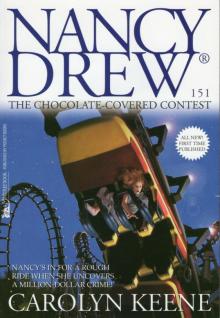 151 The Chocolate-Covered Contest
151 The Chocolate-Covered Contest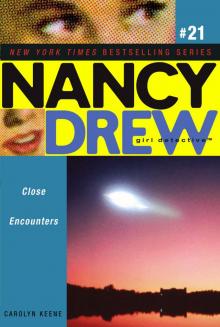 Close Encounters
Close Encounters The Emeral-Eyed Cat Mystery
The Emeral-Eyed Cat Mystery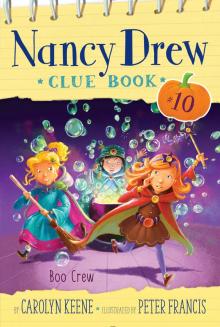 Boo Crew
Boo Crew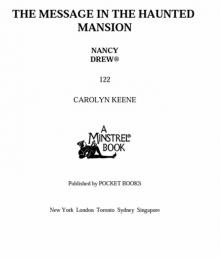 The Message in the Haunted Mansion (Nancy Drew Book 122)
The Message in the Haunted Mansion (Nancy Drew Book 122) A Nancy Drew Christmas
A Nancy Drew Christmas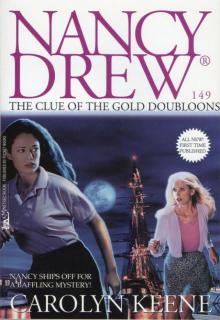 149 The Clue Of The Gold Doubloons
149 The Clue Of The Gold Doubloons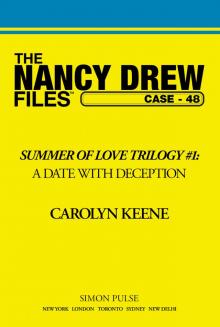 A Date with Deception
A Date with Deception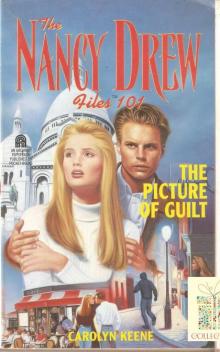 101 The Picture of Guilt
101 The Picture of Guilt The Secret in the Spooky Woods (Nancy Drew Notebooks Book 62)
The Secret in the Spooky Woods (Nancy Drew Notebooks Book 62)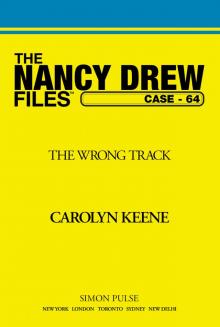 The Wrong Track
The Wrong Track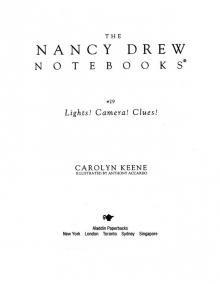 Lights! Camera! Clues!
Lights! Camera! Clues!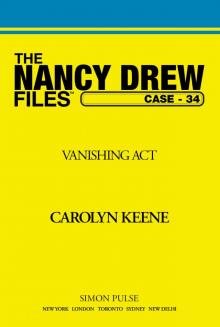 The Vanishing Act
The Vanishing Act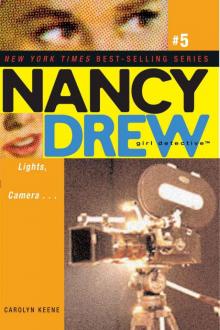 Lights, Camera . . .
Lights, Camera . . .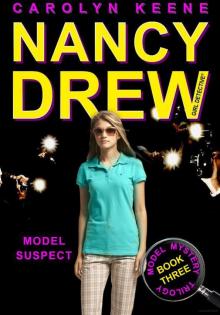 Model Suspect 3
Model Suspect 3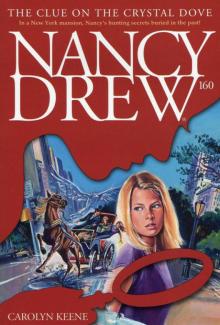 160 The Clue On The Crystal Dove
160 The Clue On The Crystal Dove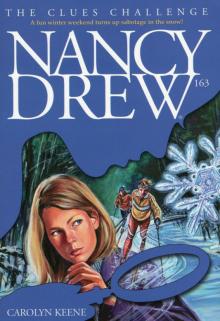 163 The Clues Challenge
163 The Clues Challenge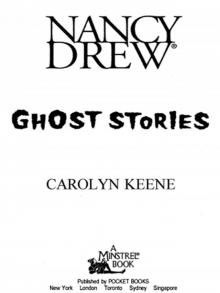 Ghost Stories (Nancy Drew)
Ghost Stories (Nancy Drew)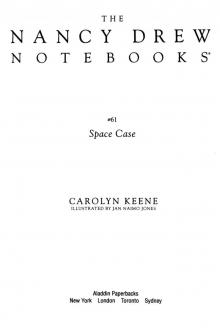 Space Case (Nancy Drew Notebooks Book 61)
Space Case (Nancy Drew Notebooks Book 61)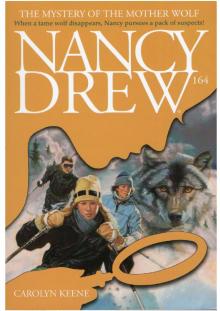 164 The Mystery Of The Mother Wolf
164 The Mystery Of The Mother Wolf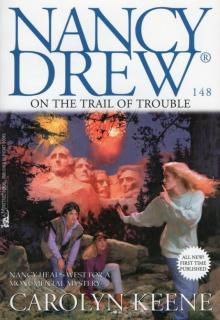 148 On The Trail Of Trouble
148 On The Trail Of Trouble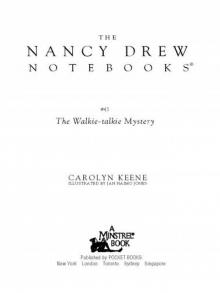 The Walkie-Talkie Mystery
The Walkie-Talkie Mystery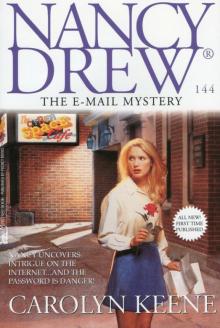 The E-Mail Mystery
The E-Mail Mystery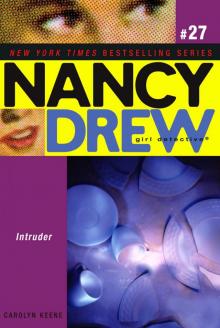 Intruder (Nancy Drew (All New) Girl Detective)
Intruder (Nancy Drew (All New) Girl Detective)![The Stolen Relic [Nancy Drew Girl Detective 007] Read online](http://i1.bookreadfree.com/i2/04/11/the_stolen_relic_nancy_drew_girl_detective_007_preview.jpg) The Stolen Relic [Nancy Drew Girl Detective 007]
The Stolen Relic [Nancy Drew Girl Detective 007]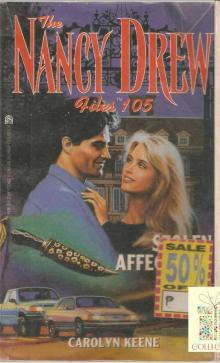 105 Stolen Affections
105 Stolen Affections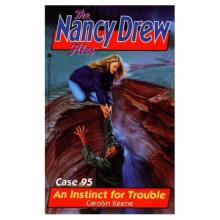 An Instict for Trouble
An Instict for Trouble 161 Lost In The Everglades
161 Lost In The Everglades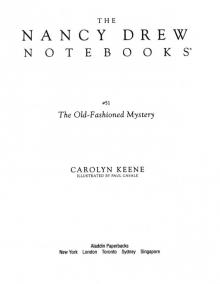 The Old-Fashioned Mystery
The Old-Fashioned Mystery Perfect Plot
Perfect Plot